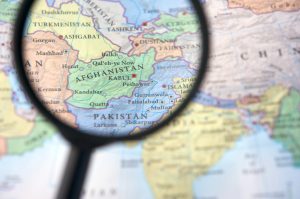India has, for all practical purposes, joined the small number of nations that have discovered the necessity of doing business with the Taliban regime in Afghanistan. Sans official recognition, which under the circumstances is only of ceremonial importance, New Delhi’s “pragmatic policy” is bound to be seen as a source of legitimacy for the Islamic Emirate. New Delhi, in return, hopes to regain its lost leverage in Kabul.
The evolution of New Delhi’s policy has been slow, incremental, and yet, unidirectional as India acclimatizes itself to the winds of change in Kabul. All along, it has carefully underscored the concern for the common Afghans and provided humanitarian assistance. At the core of its efforts, however, is the strategic objective of safeguarding its national security interests amid the geopolitical flux that has once again reduced Afghanistan to a territory whose potential instability evokes fear but little genuine concern, and even less affirmative action.
In June 2022, less than a year after the Taliban capture of power, New Delhi made a dramatic policy U-turn with the deployment of a technical team to Kabul to “oversee the disbursement of humanitarian aid.” The decision strategically reactivated the embassy, which had been shut after the Taliban seized power on August 15, 2021. Following that, Indian officials have made periodic visits to Kabul. New Delhi has also received Afghan officials for administrative, governance, and technical training modules.
In the latest development, an Indian official team, lead by Joint Secretary in the Ministry of the External Affairs (MEA) J. P. Singh, made a two-day visit to Kabul on November 4 and 5. The team called on Taliban Acting Defense Minister Mullah Mohammad Yaqoob and Foreign Minister Amir Khan Muttaqi, among others, including the UNAMA and international NGO personnel, members of the business community, and former Afghan President Hamid Karzai.
It is unusual for an MEA official to meet a defense minister, but not surprising given the circumstances. The MEA spokesperson alluded to the team’s discussions in a briefing on November 7. He said that the team held discussions on India’s humanitarian assistance to the people of Afghanistan and also discussed the use of the Chabahar port in Iran by Afghan traders.
Three days after the visit, the Taliban officials claimed that the Afghan consulate in Mumbai has started issuing passports to Afghan nationals in India. An Indian media report also referred to a Taliban request to appoint its nominee as the “second secretary” in the Mumbai consulate. This is under active consideration by the MEA. Meanwhile, the Afghan Embassy in New Delhi and the two consulates in Mumbai and Hyderabad have quietly passed into the hands of pro-Taliban officials, with the unofficial understanding that they would continue to fly the erstwhile civilian regime’s flag and would refrain from openly promoting the Islamic Emirate. Strategically, this arrangement could change in a matter of months, as New Delhi gets more comfortable in doing business with the Taliban and in the absence of any other viable alternatives in Afghanistan.
The perception that New Delhi’s moves are not out of compulsion but a matter of strategic choice is bound to raise concerns in the West and the United States. Akin to its independent and robust trade, strategic, and diplomatic ties with Russia, which India has forcefully defended, this policy readjustment toward the Taliban could be interpreted as New Delhi breaking ranks with the West. The perspective in New Delhi, however, is different.
“What else can New Delhi do?” is the rhetorical question circulating through the policy circles in New Delhi.
The situation is dynamic. The Taliban have made repeated overtures to India to do more in Afghanistan. Meanwhile, nearly every other regional country, including China and Russia, has embraced the Islamic Emirate. Donald Trump’s re-election in the United States is bound to push Afghanistan further into the U.S. policy wasteland. This compounds India’s problems, which an isolationist policy is unlikely to address. Under the circumstances, not doing business with the Taliban would be self-limiting. Additionally, the Taliban’s worsened ties with Islamabad may have created a fresh window of opportunity for New Delhi to reinvent itself in Kabul.
Multiple “pro” factors are shaping India’s policy toward the Taliban. The “cons,” including the Taliban’s violation of the rights of girls, women, and minorities, remain important to consider. But, as the statecraft of the government in New Delhi suggests, India may be able to influence the Taliban through its strong ties, rather than being a sulking idealistic power. At the end of the day, it could still be a trial-and-error method. But there are strong indications that New Delhi is taking a giant leap of faith.

































